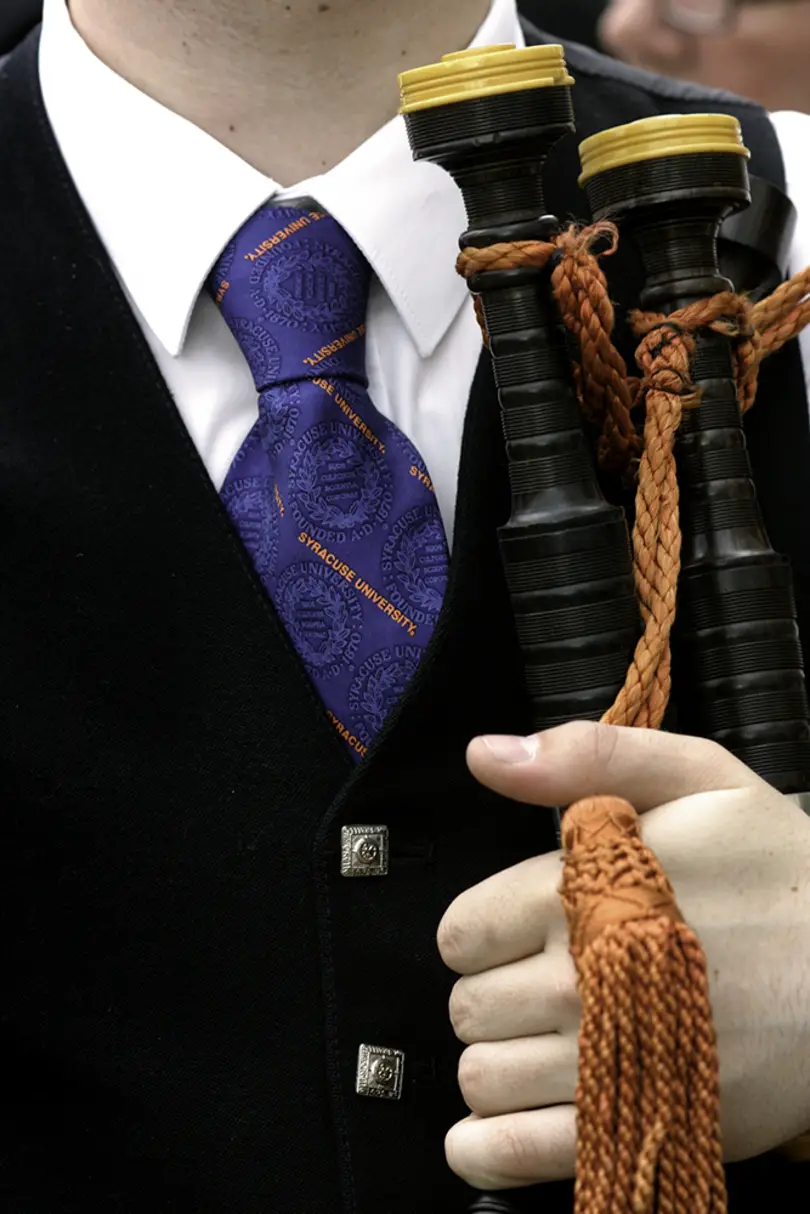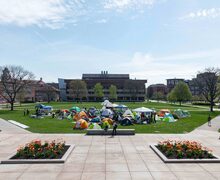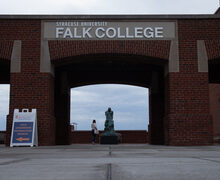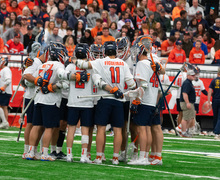Public pledge: Britain, Scotland give $264,000 grant to Lockerbie Scholars
Kelly Rodoski traveled to Lockerbie, Scotland in December for the 25th anniversary of the Pan Am Flight 103 bombing. She met men and women who could recall the odor from jet fuel that lingered over their childhood homes and the overwhelming sense of shock and loss that accompanied the weeks and months after the bombing.
When they found out she was visiting from Syracuse University, which lost 35 students in the bombing, they immediately identified with Rodoski, the chair of SU’s Pan Am 103 25th Anniversary Committee.
“We were two communities that were devastated by this tragedy,” she said.
Though the tragedy happened more than a decade ago, the British government is still making strides to keep the communities connected. On Wednesday, the Chancellor of the Exchequer, George Osborne, announced that the United Kingdom will donate £100,000 from its 2014 budget to the Lockerbie Trust, Rodoski said. The pledge adds to a £60,000 donation from the Scottish government in December, bringing the total public pledge to about $264,000, according to a Thursday SU News release.
When the trust was founded in the wake of the 1988 bombing that killed 270 people, the founding money came from private donors, said Judy O’Rourke, director of undergraduate studies at SU. Currently, the Lockerbie Trust and SU jointly fund one academic year of study for two students from Lockerbie, where parts of the plane crashed.
Despite the public funding pledges, nothing yet indicates that the Lockerbie scholarship’s conditions will change. The Lockerbie trustees, who are based in Scotland, and not the university, will ultimately decide how the money is spent, O’Rourke said.
“The trustees will determine how that is saved, put to the principal or spent,” O’Rourke said. “That is a trustee decision.”
O’Rourke said that, to the best of her knowledge, the British and Scottish governments have not pledged money to the Lockerbie Trust before the recent donations. Since the first scholars came to SU in 1990, the contributions to the Lockerbie Trust have largely come from private donors, she said.
After traveling to Lockerbie, Osborne said the British government decided to support scholarships for Lockerbie residents to study in the U.S. but it isn’t yet fully clear if the money will directly fund the Lockerbie scholarships. O’Rourke stressed that she could only speak from the university’s perspective, as the charity’s trustees will determine the exact use of the public funds contributed by the British and Scottish governments.
In the program’s current state, SU covers tuition costs, while the Lockerbie Trust pays for room and board and additional fees, O’Rourke said. Contributions vary depending on the costs of attending SU for that year, she said.
SU recently announced that tuition will increase 3.6 percent to $40,380 and room and board will both increase by 2.9–3 percent for the 2014–15 academic year. The combination of both rates for two students is less than the $260,000 pledged in public funds.
Rodoski added that while the scholarships are a widely known Lockerbie Trust contribution, the charity was established to perform a variety of tasks to “make Lockerbie a better place.” Rodoski said she wasn’t sure how recent government contributions would affect the program’s future.
“I have not heard of any plans of expansion, but that doesn’t mean that there aren’t,” she said.
The trust and SU’s combined contributions allow two students to spend one fully funded academic year at SU, but many scholars have sought mechanisms to continue their education at SU once the funding ends.
Some have managed to continue their education by taking resident advisor positions or petitioning SU for more financial aid. But Rodoski said since the first Lockerbie Scholars got to SU in 1990, only three have completed a bachelor’s degree in the U.S.
Callum Johnstone, a 2013-14 Lockerbie Scholar, said in an email he hopes to extend his stay at SU beyond one year. Finding a way to fund the rest of his education may be challenging, he said.
“I wish that this scholarship allowed the option for Lockerbie students to decide whether or not they would like to stay and graduate here at SU,” Johnstone said.
Johnstone said he has been applying for more financial aid “without a huge amount of success,” but he said he has been awarded a resident advisor position that will help him afford room and board.
RA’s have their room and board waved, which for the 2014-15 academic year could be as much as $18,340.
Fergus Barrie, a junior sport management major and 2011–12 Lockerbie Scholar, said most of the Lockerbie Scholars returned to Scotland to finish college. Barrie’s Lockerbie scholarship ended after his freshman year, but he didn’t want to leave, he said.
“I couldn’t see myself going back home to Scotland,” Barrie said. “I could really see myself finishing my four years here at Syracuse.”
Barrie said the public funding shows an ongoing commitment to the cultural exchange.
Erin McLaughlin, a 2003–04 Lockerbie Scholar and one of the students who graduated from SU with a bachelor of arts in history, echoed Barrie’s sentiment in an email.
She said an RA position, financial aid, parental contributions and support from faculty like O’Rourke helped her complete her degree at SU. She continues to live in the U.S. and now works as an assistant director of experiential education at Fordham University.
If the funding ensures more opportunities for future Lockerbie scholars, the connection between the two communities will only grow stronger, she said.
Said McLaughlin: “The money from the government could ensure that more Scottish students are given the wonderful experience of a year at Syracuse University and that the connection that was established through adversity is allowed to be strengthened.”
Assistant News Editor Brett Samuels contributed reporting to this article.
Published on March 25, 2014 at 1:22 am
Contact Jacob: [email protected]






